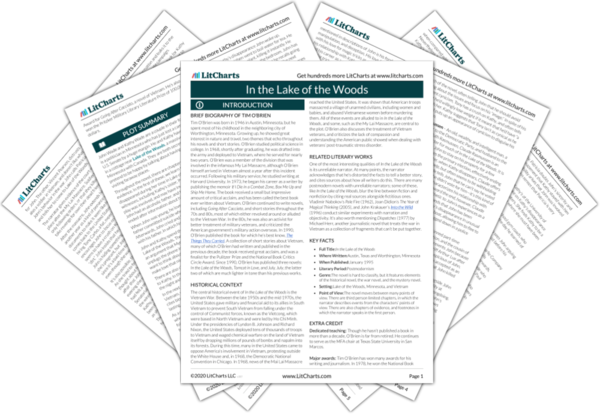Summary
Analysis
This chapter discusses John’s behavior on the night before he supposedly discovered that Kathy was missing. He wakes up in the night, twice. On the second occasion, he says, “Kill Jesus,” and goes to boil water for tea. He imagines tearing out “the bastard’s” eyes.
John’s behavior isn’t remotely comprehensible—we have no idea why he would say these things or behave this way. Still, based on the previous chapter, it seems likely that his behavior is related to his experiences in Vietnam in some way.
Themes
John waits for the water to boil, and thinks about the primaries. He lost all but a few small cities. One minute, he thinks, he was presidential. The next, he was hated. John thinks that he has been betrayed; secrets have been betrayed. In the end, he lost by a margin of more than 100,000 votes. John interprets this loss as an end to his political career, and rues the “ambush politics” that made him lose the election.
John clearly sees himself as the victim—it’s left up to us to agree or disagree with him. Based on what we know about his hypocrisy and denial, we’re probably inclined to think that he’s being hypocritical here, even if we’ve yet to understand what information made John lose his campaign.
Themes
The water boils, and John, saying “Kill Jesus,” pours it over a geranium plant near the cottage’s fireplace. The plant dies almost instantly, and John laughs. He fills the kettle again with water for it to boil. He then walks to the bedroom, where Kathy is sleeping.
In the days following Kathy’s disappearance, John will think of what he should have done that night. He should have woken Kathy up and apologized to her, telling her that he was taking his electoral defeat hard, and that he was fighting with memories of Vietnam. Instead, John remembers touching Kathy’s hair, pulling a blanket over her body, and returning to the living room.
John always prefers to hide information rather than reveal it. It’s seems like that this is why his behavior is erratic—instead of dealing with his experiences in Vietnam, he keeps them hidden or even repressed, which means that they can continue to influence his behavior.
Themes
Get the entire Lake of the Woods LitChart as a printable PDF.

John later claims that he forgets what else he did that night. At one point, he remembers standing in the lake. At another time, he was near a dock. At some point he got back in bed. He had a nightmare about electric eels and boiling water. The next morning, he woke to find that Kathy wasn’t there. When he realized this, he rolled over and went back to sleep.
John’s nightmare is important, because it shows that, regardless of what John did, he has the potential to behave violently and destructively. We end with an image to which O’Brien will return again and again—John with his face buried in his pillow. This image can be shocking, poignant, hypocritical, etc.—it all depends on our perspective, as we’ll come to see. And it is also an image that captures the idea of John hiding from things, repressing things.
Themes












